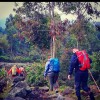Private guides and guided tours in Uganda
Private guides in Uganda
Private Guide in Kampala - Arnold
(Member Since 2024) Excursions/tous in the following cities: Masindi, Kanungu, Entebbe Languages: englishAm an ethusiastic experienced safari guide in Uganda with a 8 years experience in guiding tourists to gorilla trekking, wildlife photography trips, community activities and culture. Am a 31 years old male born...
Private Guide in Kampala - Ashiraf
(Member Since 2023) Languages: EnglishOur excursions - there are some of the best and unforgettable African safaris. We are a renowned safari operator based in Uganda, offering exceptional tours across East African region ranging from wildlife...
Private Guide in Kampala - Joshua
(Member Since 2024) Excursions/tous in the following cities: Kampala Languages: EnglishI'm Joshua a Local Ugandan tourist guide driven by passion and Enthusiasim for Travel, Learning from people and showing them what was and what is. With over 8 years of experience in tourist Guiding and...

Uganda
Language: English
Currency: Ugandan shilling (UGX)
Calling Code: +256
CAPITAL CITY OF Uganda: Kampala
LANGUAGE OF Uganda: English
CURRENCY OF Uganda: Ugandan shilling (UGX)
COMMENTS ABOUT Uganda:
The Republic of Uganda is a landlocked country in East Africa
Cities : Kampala (capital), Entebbe, Jinja, Kabale, Kisoro, Rakai
Best Places : Bwindi Impenetrable National Park, Mgahinga Gorilla National Park, Kabelaga National Park, Kidepo Valley National Park, Murchison Falls National Park, Queen Elizabeth National Park, Kibale Forest National Park, The Rwenzori
Electricity : 240V 50HZ (UK plug type)
Calling Code : 256
Uganda achieved independence from the UK in 1962. The dictatorial regime of Idi AMIN (1971-79) was responsible for the deaths of some 300,000 opponents; guerrilla war and human rights abuses under Milton OBOTE (1980-85) claimed at least another 100,000 lives. During the 1990s, the government promulgated non-party presidential and legislative elections.
CLIMATE OF Uganda: tropical; generally rainy with two dry seasons (December to February, June to August); semiarid in northeast
RELIGION OF Uganda: Roman Catholic 33%, Protestant 33%, Muslim 16%, indigenous beliefs 18%
POPULATION OF Uganda: 26,404,543 - estimates for this country explicitly take into account the effects of excess mortality due to AIDS; this can result in lower life expectancy, higher infant mortality and death rates, lower population and growth rates, and changes in the distribution of population by age and sex than would otherwise be expected (July 2004 est.)>>>
ECONOMY OVERVIEW OF Uganda: Uganda has substantial natural resources, including fertile soils, regular rainfall, and sizable mineral deposits of copper and cobalt. Agriculture is the most important sector of the economy, employing over 80% of the work force. Coffee accounts for the bulk of export revenues. Since 1986, the government - with the support of foreign countries and international agencies - has acted to rehabilitate and stabilize the economy by undertaking currency reform, raising producer prices on export crops, increasing prices of petroleum products, and improving civil service wages. The policy changes are especially aimed at dampening inflation and boosting production and export earnings. During 1990-2001, the economy turned in a solid performance based on continued investment in the rehabilitation of infrastructure, improved incentives for production and exports, reduced inflation, gradually improved domestic security, and the return of exiled Indian-Ugandan entrepreneurs. Corruption within the government and slippage in the government's determination to press reforms raise doubts about the continuation of strong growth. In 2000, Uganda qualified for enhanced Highly Indebted Poor Countries (HIPC) debt relief worth $1.3 billion and Paris Club debt relief worth $145 million. These amounts combined with the original HIPC debt relief added up to about $2 billion. Growth for 2001-02 was solid despite continued decline in the price of coffee, Uganda's principal export. Solid growth in 2003 reflected an upturn in Uganda's export markets.



 French
French Spanish
Spanish Russian
Russian


















